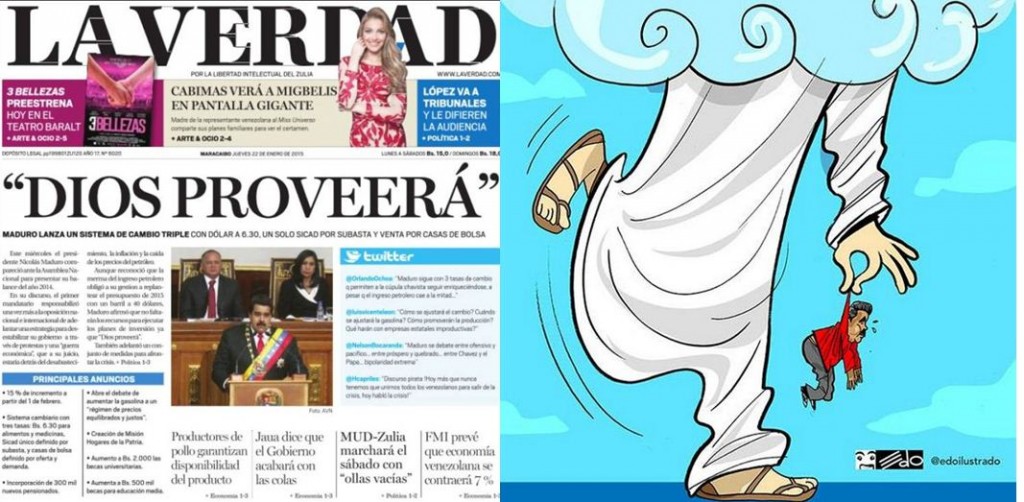EspañolOn Wednesday, January 21, Venezuelan President Nicolás Maduro spoke before the National Assembly to lay out the national government’s plan for 2015. While the president was expected to present his administration’s 2014 report, he instead took the opportunity to address the country’s ailing economy amid decreased revenues from plummeting oil prices.
“There is less foreign currency [for Venezuela]: from US$96 per barrel to $40, but we’ll never lack God. God shall provide, and we’ll get the resources we need to keep the country going,” said Maduro, who blamed the US government for the drop in the price of oil.
The following day, “God shall provide” became a trending topic on Twitter in Venezuela, while cartoonists echoed the hopeful incantation.
In his speech, President Maduro revealed specific measures to curb food shortages and rampant inflation: a minimum wage increase, more social benefits, a restructuring of currency controls, and a potential increase in the price of gasoline.
In response to the long grocery-store lines that have marked the country’s shortage crisis, Maduro said the government plans to expand its biometric identification system and “safe provision” ration cards to limit “excessive purchases” throughout the country.
Maduro admitted during his speech that the basic basket of goods for Venezuelans has been “disrupted,” but urged citizens to “abandon consumerism” and become more mindful about the importance of saving. Likewise, he ordered government ministers to closely inspect “every distribution and stocking company in the country” to put an end to the alleged hoarding the president blames for shortages.

Boris Ackerman, head of the Economics and Administration Department at Simón Bolivar University, believes Maduro’s inspection strategy is a political ploy to confiscate products and redistribute them in order to win favor from the public.
Maduro acknowledged the 80-percent disapproval rate for his administration during the speech, but then dismissed it as unimportant. “I don’t care if it reaches 150 percent,” charged the president.
Ackerman told the PanAm Post that the president’s nationwide rationing system will leave it to inspector’s to decide whether or not someone is guilty of hoarding or other “speculation crimes.”
Bad News for Producers
Maduro also stated that the country’s official three-tier exchange rate for the bolívar will remain in place, with some modification, while the “economy stabilizes.” The government will maintain a 6.30 Bs. per US dollar rate for food and health sectors, a second rate resulting from the average of Sicad 1 (12 Bs.) and Sicad 2 (52 Bs.), and a third rate will be operated by brokerage firms.
Ackerman concludes the announcements mean a continuation of the government’s “socialist model,” imposing on the country “a series of currency restrictions, price, distribution, and sales controls.”
The analyst points out that the new exchange rates will mean a “severe” devaluation for the nation’s currency: “If a [non-food non-health] product goes from 12 Bs. per US dollar (Sicad 1) to, say, around 36 Bs. [with the new rate], we’re talking about a 200-percent cost increase and a 66-percent loss in value of the bolívar.”
In an interview with Radio Caracas Radio, economist Tamara Herrera lamented that maintaining the auction system to obtain foreign currency is “terrible news for the productive sector.” She says it creates an unfair and uncertain environment for businesses, preventing them from planning production and creating “completely distorted” prices.
President Maduro also announced a 15-percent raise in the minimum wage starting February 1, going up to 5,633.7 Bs. (US$31.47 at the black-market rate). Retirees receiving a Social Security pension will also get a “health bonus” this year.
Near the end of his speech, Maduro toyed with the idea of increasing the country’s highly subsidized gasoline prices and said he hoped the National Assembly would discuss a possible hike in 2015.
“The government is still afraid to come out and say gasoline will cost more because of the potential backlash among the population,” said Ackerman, “and they’re trying to come up with remedial mechanisms before marking up the prices.”
Lagging Economy
On Wednesday, January 21, the International Monetary Fund (IMF) cut its 2015 growth forecast for Venezuela’s economy to negative 7 percent. A $10 drop in the price of oil per barrel means a trade deficit equal to 3.5 percent of the country’s GDP, according to the IMF.
Economist Herrera said a “brutal” reduction in capital investment looms ahead and the GDP’s fall will be “very strong.” She points out the IMF calculated its pessimistic forecast even before Maduro’s “God shall provide” speech.
Both Ackerman and Herrera agree that an increase in the minimum wage and social benefits are measures that seek to partially compensate for the overall increase in prices following the devaluation.
Maduro’s announcements on Wednesday promote “uselessness, guile, and trickery,” said the analysts. “Bad times are coming, the measures are completely inappropriate and will only perpetuate the country’s problems,” Ackerman concluded.
 Versión Español
Versión Español












